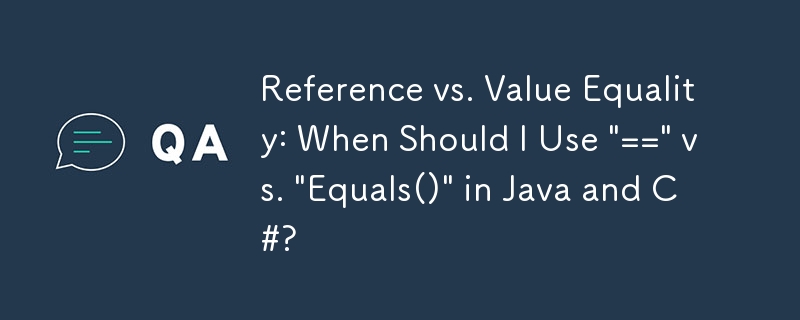

Distinguishing between Reference and Value Equality in Code
When comparing two objects in a programming language, understanding the nuances between equality operators is crucial. In this article, we delve into the differences between the "==" and "Equals/equals" operators, highlighting their behaviors in both Java and C#.
Java: Strict Comparison of Object Identities
In Java, the "==" operator performs a strict comparison, checking if two values refer to the exact same object. This is known as "reference equality." Java does not provide any customization options for this behavior.
C#: Dependent on Type and Context
In C#, the behavior of "==" is context-dependent. If no custom operator overload is defined, it defaults to reference equality, mirroring Java's semantics. However, if there is an overload that matches the compile-time types of the values being compared (such as two string literals), that overload will be invoked instead. Custom overloads often implement "value equality," which tests for equivalent values regardless of reference.
a.Equals(b) and a.equals(b): Virtual Method Calls
In both Java and C#, "a.Equals(b)" and "a.equals(b)" are virtual method calls on the "Object" class. Unless a specific implementation has been introduced by the object's runtime type, these methods default to checking for reference equality. However, it's important to note that they rely on the runtime type, not the compile-time type.
Special Handling for Nullable Values
In the case of nullable values (e.g., "a == null" or "a.equals(null)"), attempting to call "a.equals(b)" or "a.Equals(b)" will result in a "NullReferenceException" or "NullPointerException."
Conclusion
Understanding the distinctions between "==" and "Equals/equals" is essential for accurate comparisons in code. Java enforces strict reference equality with "==", while C#'s behavior can be customized through overloads. Both languages utilize virtual method calls for "Equals/equals," which may be overridden in derived classes to implement custom equality checks.
The above is the detailed content of Reference vs. Value Equality: When Should I Use \'==\' vs. \'Equals()\' in Java and C#?. For more information, please follow other related articles on the PHP Chinese website!
 Tutorial on buying and selling Bitcoin on Huobi.com
Tutorial on buying and selling Bitcoin on Huobi.com
 How to turn on vt
How to turn on vt
 How to convert excel to vcf
How to convert excel to vcf
 How to check dead links on your website
How to check dead links on your website
 How to change file type in win7
How to change file type in win7
 What is the difference between JD International self-operated and JD self-operated
What is the difference between JD International self-operated and JD self-operated
 The role of linux terminal commands
The role of linux terminal commands
 How to write triangle in css
How to write triangle in css




